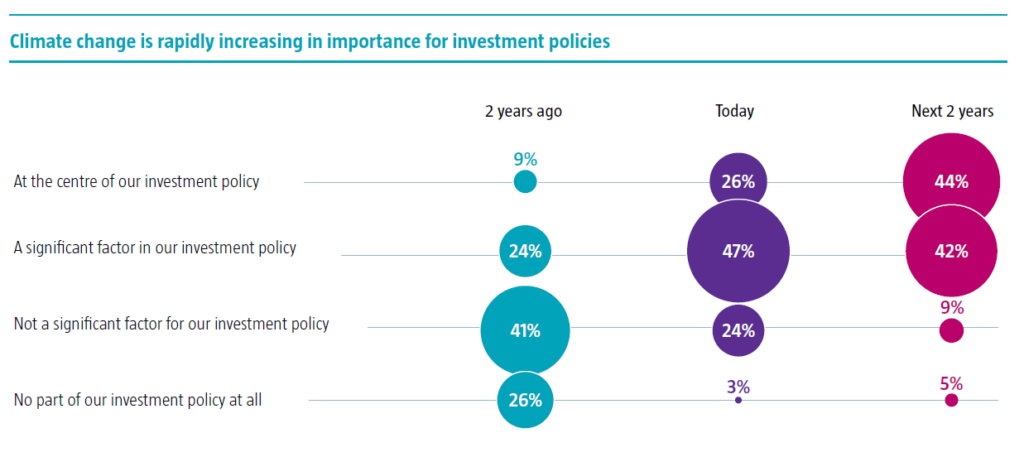Nearly three-quarters of investors have said climate change will form a significant part of their investment policies, but more specialised expertise in the area is still required.
These are the findings from a survey by Robeco, 2021 Global Climate Survey, which covers 300 of the world’s largest institutional and wholesale investors in Europe, North America and Asia Pacific, representing a total of around $23.4trn in assets under management.
The survey found climate change is already a significant factor in the investment policy of almost three-quarters (73%) of investors surveyed, and nearly all respondents said they already have a formal policy on climate change in place or that climate will be integrated as part of a broader sustainability policy in the near future.
How would you describe the importance of climate change to your organisation’s investment policy 2 years ago, today, and in the next 2 years?

One strategy used is net-zero carbon emissions commitments, although the survey found just 17% had these in place. However, it expects this to rise to 52% of investors in the next five years.
This complements the findings of the recent PRI Inevitable Policy Response update, which said net-zero commitments by countries now representing 70% of GDP and 65% of emissions have doubled.
See also: – Investment firms’ net-zero commitments
The Robeco survey also said divesting from carbon-intensive assets will rise sharply in the next five years, to 81% of institutional investors and 75% of wholesale investors. However, at present around 60% of investors globally have divested their carbon-intensive assets over the past five years.
Renewables, bioenergy and hydrogen for power and fuel is the most relevant decarbonisation driver for 81% of respondents.
Despite these encouraging signs, respondents highlighted a need for more expertise and support. Unsurprisingly, lack of data and reporting was cited by 44% globally and 58% in Europe as the biggest barrier to implementing decarbonisation. In the Asia Pacific region, the shortage of suitable low-carbon investment strategies is the biggest concern (54%), and North America sees the lack of internal expertise on decarbonisation as biggest challenge (45%).
Gilbert Van Hassel, CEO of Robeco, said: “Moving to a low-carbon economy needs a global effort, with governments, regulators, the corporate sector and individuals all playing their part. This survey shows that the vast majority of investors are committed to tackling climate change, which is a promising sign.
“Yet it has also revealed a substantial knowledge gap when it comes to fully understanding these major issues, with many investors not knowing where to start or how to make a difference. The time to act really is now.”








